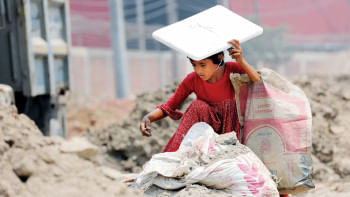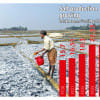Rising human toll of a deadly heatwave

In a country where ordinary people still suffer disproportionately in both extreme cold and heat, despite its vaunted economic progress which should have minimised such sufferings, it is perhaps a given that there would be deaths galore in proportion to the severe heatwave now underway. Yet it is difficult to accept them as inevitable. Every death feels more like a failure on the part of the state than the outcome of individual immune responses. According to a report by this daliy, at least 10 people died of heat stroke over the last week, three of them in the 24 hours till Tuesday morning.
The estimate, however, is only from government hospitals. And the DGHS has no data on hospitalisations preceding April 22 even though there has been a heatwave every day in this month except on the 9th and 10th. So, the human toll of this unprecedented heatwave—the longest in 76 years—is likely much higher. Tuesday ends Bangladesh's warmest month in recorded history, both in terms of heatwave duration and average maximum temperatures. The question is, how much of the suffering that followed is due to the weather? How much of it was avoidable? Probing this topic is crucial to our survival in the coming years in a world fast warming up.
While there are bigger issues contributing to rising temperatures in Bangladesh—such as unplanned urbanisation and rapid depletion of forests, trees and low-lying areas—that need critical policy attention, we should also consider more immediate issues related to our preparation or lack thereof. Topmost among them is the electricity crisis, especially in rural areas. Throughout April, there have been long and frequent spells of loadshedding outside Dhaka. Also, there were few initiatives from city corporations and health authorities to lessen public suffering, despite multiple heat alerts. Hospitals have struggled to accommodate or serve rising patients suffering from heat-related illnesses. The education authorities, on the other hand, showed poor leadership as they flip-flopped on classroom shutdown decisions. Resuming classes despite a heat alert on Sunday reportedly caused two school teachers to die of heat stroke and numerous students to fall sick.
All this shows our poor level of preparation which is really unfortunate. This must change going forward. The meteorological department predicts that May will bring some relief from the scorching heat. There might be rain and thunderstorms as soon as May 2, and the heatwave spells would be much shorter, albeit slightly humid. This is good news, but we must remain alert. We urge the authorities to boost their preparation, especially in the 21 distracts that have been identified as particularly vulnerable, so that the sufferings of April are not repeated.


 For all latest news, follow The Daily Star's Google News channel.
For all latest news, follow The Daily Star's Google News channel. 










Comments